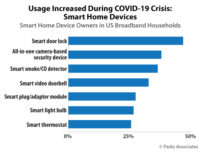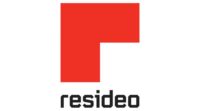New Parks Associates smart home research finds providers and manufacturers are increasingly competing on price, innovation and privacy protections. The firm’s Smart Home Tracker notes 44 percent of U.S. broadband households who do not own or intend to purchase a smart home device perceive the devices as too expensive, so as more manufacturers deploy low-cost products with advanced features, the market could start to overcome this barrier.
“The perception of high prices continues to be the leading inhibitor for smart home device purchases,” said Brad Russell, research director, connected home, Parks Associates. “Previously, companies would introduce an advanced model of their product to innovators and early adopters, and then maybe come down-market with a simpler, low-priced model, but as more product manufacturers enter the space, increased competition is driving industry players to integrate high-end features into their most affordable models. Consumers will start to see more value per dollar spent.”
The Smart Home Tracker also reveals privacy concerns are increasing among consumers — 35 percent of U.S. broadband households who do not own or intend to purchase a smart home device report security and privacy concerns as a reason not to purchase these devices, up from 25 percent in 2018. In response, some companies have recently launched smart indoor cameras promoting various privacy features that give owners more options to disable or adjust their cameras when privacy is desired.
The COVID-19 pandemic and the resulting social distancing guidelines are forcing companies to find new and unique ways to promote these privacy features and deliver support to consumers. With the COVID-19 crisis continuing, companies are also exploring ways to improve performance of the home network.
“Google has updated its Nest Wi-Fi router in order to help slow home networks support multiple video calls and games simultaneously,” said Patrice Samuels, senior analyst, Parks Associates. “This move by Google will drive better user experiences. It is also very timely as 40 percent of U.S. broadband households now report using virtual meetings or video conferencing services, while only 26 percent reported using these services prior to the COVID-19 crisis.”
The Smart Home Tracker also tracks several major market moves from solution providers in the multifamily space, with Allegion and SmartRent both launching smart access solutions aimed to help property managers improve security and operating efficiencies at MDU properties.



